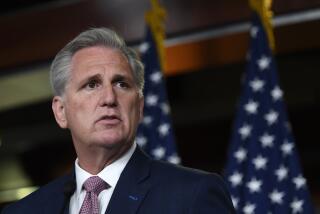COLUMN RIGHT/ BRIAN O’LEARY BENNETT : Clinton Plan: Only Insiders Need Apply : Caps on personal spending, contributions would shut out outsiders, lock in incumbents.
- Share via
Billy the Kid Clinton and his gang of big-government bandits are about to raid your wallet again with his latest scheme to have taxpayers pick up the cost of congressional campaigns.
It should be rejected. Not only because we can’t afford it but because the single most important objective of election financing law should be to facilitate access to the electoral process, not perpetuate its ruling class.
President Clinton proposes to vastly increase the existing regulatory scheme, which already inhibits free speech, shuts down minor party candidates, shuts out the average working candidate and virtually locks into office incumbent officeholders.
The President proposes to raise taxes in order to spend at least $75 million of taxpayer money on congressional campaigns, place a cap on spending, limit the amount of personal money a candidate can use and reduce campaign contribution limits. Each of these so-called reforms will make it more difficult for outsiders to come in and for insiders to be thrown out.
Following a pattern, Clinton and the Democrats also seek to breed class warfare and envy by limiting the amount of personal money any one individual can contribute to his or her own campaign.
Earlier this year, I bowed out of a special election for the state Senate because I could not compete financially against the personal wealth of my main competitor.
Wealthy individuals like Ross Perot, Richard Riordan and even Dianne Feinstein should not be penalized because they want to use their own (or their spouse’s) money in their own political race.
My complaint is not with wealth but with the complex and onerous series of laws that prevent the non-wealthy from fairly and quickly competing with incumbent officeholders and the wealthy.
We must fight to protect the rights of the givers to give, the candidates to receive and spend and the voters to be the ultimate judge of a campaign effort, as they see fit. We can do this by:
*Raising contribution limits: Clearly this is where the non-wealthy challenger is most severely disadvantaged. The present congressional campaign contribution limits of $1,000 and $5,000 were enacted in 1974. That limit is too low and no longer reflects the realities of the costs of campaigns. These limits should be raised, if not abolished. By eliminating limits, at least the opportunity exists to raise money sufficient to compete against officeholders who raise huge sums all year round, have taxpayer-financed newsletters and receive free and regular access to the press.
*Full disclosure: Require all donations to be fully and promptly disclosed so that voters (through the media and opposition campaigns) can decide whether the type and amount of a contribution should affect their vote. A prohibition against large contributions two weeks before an election would give enough time for voters to learn about these contributions.
*No transfer of funds: Effective July 1, the Federal Elections Commission will make it illegal for a state or local officeholder to transfer campaign funds into a congressional campaign account. This act alone will do more to level the playing field between officeholders and challengers, and restore integrity to contributions, than the Clinton plan will do collectively.
In 1976, the Supreme Court handed down its decision in the landmark Buckley vs. Valeo challenge to the constitutionality of the Federal Elections Commission Act. The case was brought by conservative Sen. James L. Buckley and liberal Sen. Eugene McCarthy who jointly remarked: “We believe that many of the provisions of this new law violate the First Amendment to the Constitution . . . (It) will restrict the political freedom of individual citizens . . . (and) circumscribe speech, institutionalizing advantages for incumbents, authorizing unprecedented government surveillance over political association and establishing broad investigative powers of doubtful constitutionality. The end result, we fear, will not be fairer elections but rather a restriction of dissenting points of view.”
Buckley and McCarthy lost their case but who now would disagree with the accuracy of their calamitous predictions?
Thanks to those 1974 Democrats, much has been lost in destroying political competition and the exchange of ideas in the marketplace of elections. Read the Clinton plan. It will get worse. “Son of FEC” is coming precisely because he sees government as the solution and not the problem.
By promoting a big brother, big spending, anti-free speech election “reform” agenda, Billy the Kid and his bandits will do nothing more than protect incumbents and perpetuate his party’s 40-year control over Capitol Hill.
More to Read
Get the L.A. Times Politics newsletter
Deeply reported insights into legislation, politics and policy from Sacramento, Washington and beyond. In your inbox twice per week.
You may occasionally receive promotional content from the Los Angeles Times.










